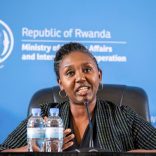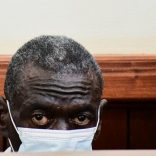Rwanda reached deal with US to take in up to 250 migrants, government says
African countries urged to apply for malaria vaccine funding

File photo: WHO
The World Health Organization urged African countries to apply for part of the $160 million in funding for the first vaccine for malaria, the mosquito-borne disease from which deaths are rising for the first time in three years.
The shot developed by GSK Plc and known as RTS,S has been piloted in Ghana, Kenya and Malawi, all of which will be the first to get further access through international vaccine alliance Gavi, the WHO said, before expansion to other eligible endemic countries.
Finding more effective inoculations against malaria has been a critical goal in fighting an infection that killed almost half a million African children in 2020, with most being under the age of five.
These numbers are “outrageous,” Matshidiso Moeti, the WHO’s regional director for Africa, said in a virtual briefing on Thursday. Getting the vaccine into more countries “will make a huge difference to African children, African families and African economies.”
Where the vaccine has been introduced, there has been a “substantial drop” in hospitalization for malaria, as well as a decline in child deaths, the WHO said. Still, supply of the doses will be limited as production ramps up. The annual estimated demand for the shot is 80 million to 100 million doses.
“In the first days of the Covid pandemic there was a question in some countries in Africa, do you know anybody who’s been affected by Covid?” Thabani Maposa, Gavi’s managing director of country programs, said at the same briefing. “But with malaria, it is exactly the opposite. Do you know anyone who has not been affected by malaria in their family, in their community?”
The news of @gavi’s multi-million dollar funding to countries, to expand access to the world’s only #MalariaVaccine, marks a key advance in the fight against one of #Africa’s most severe public health threats — Dr @MoetiTshidi
— WHO African Region (@WHOAFRO) July 21, 2022
If delivered at scale, millions of new cases could be averted, and tens of thousands of lives saved every year. For now, supplies remain limited, and achieving equitable access for all eligible children remains a priority. — Dr @MoetiTshidi
— WHO African Region (@WHOAFRO) July 21, 2022












Leave a Reply
Be the First to Comment!
You must be logged in to post a comment.
You must be logged in to post a comment.